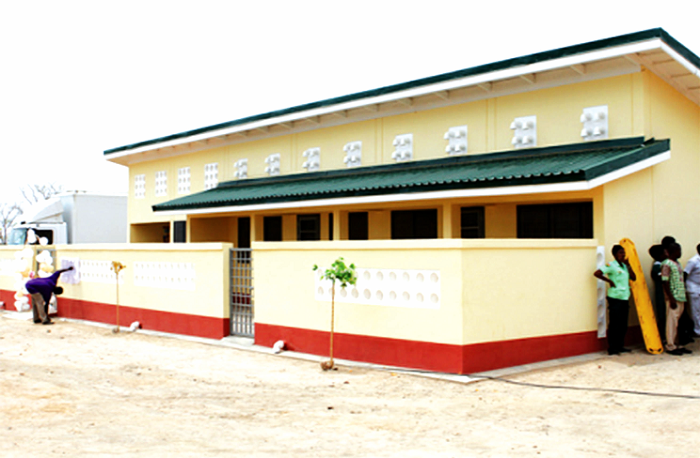
Primary health care - a basic requisite for achieving UHC and SDGs
Improving equity in access to healthcare services and better health care outcomes form a critical component of the Sustainable Development Goals (SDGs).Many nations including Ghana signed on to the SDGs in September 2015 and accepted them as benchmark for assessing countries’ development.
Advertisement
In addition to health, the SDGs and their targets focus on essential areas of development including environment, gender equality and education. The SDGs are also guided by the principles of equality, partnership building and achieving results from interventions put in place to realise the goals.
On health, improving equity in access to health requires adopting strategies that can strengthen Universal Health Coverage (UHC). The UHC is the focus of Goal 3 of the SDGs and global health experts have long recognised improvements in Primary Health Care (PHC) as a key strategy to making the UHC successful. Some empirical studies undertaken in lower middle income countries such as Ghana have also confirmed that strong PHC systems lead to improved health system goals and health outcomes. A number of illnesses could be prevented if core interventions offered by PHC systems – education on personal hygiene, improved nutrition, vaccination services, adequate clean water, family planning and treatment of common ailments and injuries - are adequately provided.
Closely linked to the UHCs and the SDGs guiding principles of equity, universality, financial risk protection and partnership building, PHC delivery is also guided by the principles of equity of access, holistic health, social acceptability and community participation, cost-effectiveness and affordability, intersectional collaboration and team-approach to addressing healthcare needs.
What progress?
To what extent is Ghana as a country working towards improving PHC systems for the country’s realisation of UHC and achieving the health-related SDGs? In Ghana, the Community-based Health Planning and Services (CHPS) approach to healthcare provision remains the major strategy being adopted for the provision of primary healthcare services. The CHPS concept places emphasis on delivering essential community-based health services through the active participation of communities.
PHC implementation in Ghana is primarily designed at the district level as a three-tier system where health services are provided at district, sub-district and community levels.
The highest level of healthcare provision is at the district level where district hospitals provide comprehensive healthcare within districts. Basic PHC services are offered at the community level (lowest level) by community health officers with support from communities.
At this level, clinical care for minor ailments, preventive and promotive services is delivered through house to house visits and emergency service delivery at a community health officer’s residence. The sub-district level (middle level) plans, develops, monitors and evaluates the implementation of community-based service delivery within the sub-district.
PHC service provision through this approach has contributed to making PHC more accessible and available for local communities in particular. Key health indicators such as infant and under-five mortality rates and access to immunisation services, as well as the incidence of communicable diseases have improved over the years.
Challenges
In spite of the successes made in PHC delivery through CHPS, the implementation strategy is fraught with some challenges. The first relates to the general misunderstanding of the CHPS strategy. Its implementation has largely focused on building compounds (providing infrastructure) and providing clinical services with minimal attention to outreach services which promote preventive and promotive care. This condition, the health sector admits, is the result of constant changes in the standard basic package of interventions to be delivered in a CHPS zone. Additionally, questions have been raised on CHPS service coverage across the country.
In 2012, the health sector estimated that approximately five per cent of Ghana’s population had been reached by CHPS services. This raises questions as to whether the strategy is efficient and cost effective in providing PHC services which are supposed to be available and accessible to all.
Above all, PHC implementation in Ghana is still largely focused on curative care where the emphasis is on removing the immediate cause(s) of signs and symptoms of a disease in an individual. Efforts at addressing the social and behavioural determinants of health are still limited. An individual’s health is determined by a complex interaction between individual characteristics, lifestyle and the physical, social and economic environment. Most experts agree that these broader determinants of health are more important than health care (treatment) in ensuring a healthy population.
Way forward
To better advance and strengthen PHC in Ghana, the Alliance for Reproductive Health Rights is urging the Ministry of Health and the Ghana Health Service to re-direct and refocus efforts at improving Ghana’s PHC systems by giving increased attention to the non-facility-based interventions of PHC. Additionally, there is the need for the health sector to strengthen the CHPS initiative by providing adequate resources that could expand both clinical and outreach services provided by CHPS zones. Finally, in addition to the CHPS, the country needs to put in place specific guidelines and resources (financial and technical) for strengthening PHC systems at all levels of healthcare delivery.
Indeed, Ghana as a country needs to strive towards having an effective and efficient primary healthcare system. A strong primary healthcare system has the potential to create a multiplier effect to create a myriad health benefits for the prevention and cure of diseases.
The writer is the Research Manager for Alliance for Reproductive Health Rights (ARHR), a women and reproductive health NGO.



